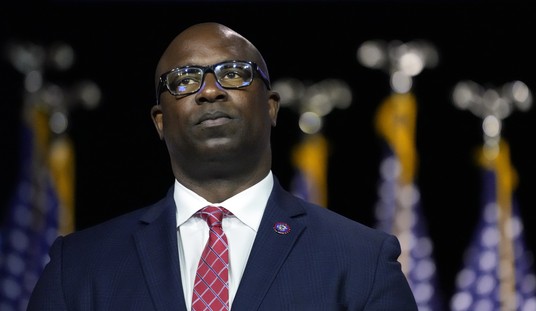This week’s most intriguing news from the publishing world:
Wool—a wildly popular, dystopian sci-fi novel—was purchased for feature-film development by director Ridley Scott and 20th Century Fox, after a fierce Hollywood bidding war.
Okay, so why is this “intriguing”?
Because Wool wasn’t issued by a major publisher. Author Hugh Howey released it himself, as a series of cheap, self-published ebooks.
Howey is understandably giddy. “A few months ago,” he writes, “I worked part time in the university bookstore, dusting the shelves and tackling shoplifters to pay the bills.” But now? “Without a single dime spent in advertising, a short story I wrote and didn’t even work to promote climbed to the top of the Amazon charts. It drew the attention of Hollywood. It landed me an agent and half a dozen foreign book deals.”
Howey’s is the latest in a rapidly growing list of self-publishing success stories—stories that, I’m happy to say, include my own. Today, self-publishing has transcended its lowly “vanity press” roots. The emergence of ebooks, “print on demand” (POD) technology, and online book-selling has allowed many writers to jump off the “Query-Go-Round” of agents and publishers, yet still establish rewarding careers as “indie” authors.
The Ebook Revolution also has shaken the print-book industry to its core. Many traditional (aka “legacy”) publishers, literary agents, bookstores, distributors, and—yes—well-established, Big Name authors view ebook self-publishing the way a vampire views a wooden stake. Here are two summaries of the history of this turmoil; and there are predictions of even more traumatic disruption.
So, let’s assume you’re a writer contemplating publication. You’re agonizing over whether to follow the traditional publishing path, or whether to take the plunge and self-publish. Okay, maybe you’ve long dreamed of winning validation from the publishing establishment—of earning acceptance from a New York agent and a venerable publisher—of seeing your book stacked in pyramids on bookstore tables—of the NYT #1 spot, and awards, and a reality show, and, gosh, maybe the cover of the Rolling Stone…
How could self-publishing possibly compete with that?
Well, my fellow scribe: Here are ten huge advantages that self-publishing has over legacy publishing.
1. Nobody Can Stop You from Publishing Your Book. Along the path to a legacy book contract you’ll be confronted by hordes of gatekeepers: literary agents, acquisition editors, editorial committees, bean counters, and publishing-house CEOs, all answering to the international conglomerates that actually own most major “American” publishers. Odds have become vanishingly small that you can run this gauntlet without being stopped dead in your tracks by a rejection letter.
You see, rather than gamble on fresh, challenging works by unknown writers, publishers prefer to play it safe. They invest mainly in the few established, best-selling authors, and they exploit trendy fads by releasing formulaic knock-offs of past bestsellers. So after Thomas Harris we were fed countless serial-killer tales. John Grisham’s success launched the “legal thriller” subgenre; Tom Clancy inspired armies of “techno-thriller” clones; Stephanie Meyer gave birth to legions of vampires. Now, E.L. James is making adult porn—oops, “erotica”—the literary dalliance du jour.
Ironically, many of these same best-selling novelists couldn’t buy a publishing contract early in their careers. Grisham’s A Time to Kill, J.K. Rowling’s Harry Potter and the Sorcerer’s Stone, and Stephenie Meyer’s first Twilight installment were buried in rejection slips. So were such classics as Richard Adams’s Watership Down (17 rejections), Ayn Rand’s The Fountainhead (12), Irving Stone’s Lust for Life (16), Richard Bach’s Jonathan Livingston Seagull (18), Vince Flynn’s Term Limits (over 60), and Jack Canfield and Mark Victor Hansen’s blockbuster Chicken Soup for the Soul (a staggering 123 nays). Yes, the esteemed gatekeepers deemed these and many others unworthy of publication. If you want a good belly laugh at their expense, read about Chuck Ross’s famous hoax.
But modern self-publishing has changed all this. No longer can paternalistic curators stand between the writer and his readers. Any book can be uploaded easily and gain within days a global sales platform on Kindles, Nooks, and other ereading devices.
Doesn’t a lot of junk get published? Sure. But it always has. And now readers—not self-appointed arbiters of literary merit—get to decide which books are worthwhile to them. Now they have many more books to choose from, and many more authors are making a living writing them.
2. You’ll Make a Lot More Money. (That is, unless your name is James Patterson or Stephen King. Which, of course, it isn’t.)
Under standard book contracts, royalty terms for authors are terrible—especially for ebooks. Most ebooks are sold through online retailers like Amazon. Let’s say you’re a traditionally published author, and assume your publisher priced your ebook at $9.99. On each sale, Amazon takes 30% of the list price, leaving about $7.00 for the publisher, agent, and you to split.
However, your publisher will keep 75% of that $7.00, or $5.25. He’ll pay you, the author, only 25% of that $7.00—just $1.75. And out of that measly amount, you then must pay your agent his 15% commission—or 26 cents.
Bottom line? You will net just $1.49 on each $9.99 ebook sale. (And that’s assuming your publisher honestly reports your sales and royalties; there is serious doubt that many do.)
Now, by contrast, what happens if you self-publish your ebook at that same price?
On each sale of your $9.99 ebook, Amazon takes its 30%, leaving you $7.00. But guess what? You get to keep all $7.00—because you won’t have a publisher or agent to share your royalties.
In fact, to be more competitive, you can even afford to cut your list price significantly, and you’ll still make a lot more money per sale than a traditionally published author would. I priced the ebook of HUNTER at just $3.99. But I still net about $1.30 more per sale than does a traditionally published author whose book is priced at $9.99. Better yet, at my much-lower price, I’ll probably sell a lot more copies of my ebook than he’ll sell of his.
Author royalties on traditionally published print books are similarly lousy—just 8% – 15%. And payment terms in standard contracts are full of tricks that work to the advantage of the house. By comparison, the royalties on my self-published print edition of HUNTER are much better.
Bottom line: Self-publishing is a better deal, by far.
3. You’ll Get Paid Much Faster. When a publisher accepts your book, he offers you an “advance” against sales. But advances usually are paid in installments stretched out over long periods. Publishers also report sales and pay royalties slowly: Royalty statements are issued semi-annually, and checks sometimes arrive even later. You’ll often wait months to find out how well your book is selling. Which means it’s often impossible to anticipate your income when you’re budgeting.
By contrast, ebook distributors like Kindle Direct Publishing and Barnes and Noble’s Pubit, and print-on-demand services such as Amazon’s CreateSpace, report your sales virtually in real time. In addition, they pay your royalties monthly, with just a sixty-day lag from the time sales began.
4. You’ll Keep All Rights to Your Work. Legacy book contracts are a minefield for the author. The sheer complexity of negotiating a contract can be confusing and intimidating. If you aren’t a lawyer, odds are you’ll unwittingly sign away forever secondary and subsidiary rights that could be a gold mine. (Here are just a few of the things you’ll have to worry about.)
And don’t trust your agent to protect you. An agent claims to represent the author’s interests. But that’s not how she really makes her living. She collects a 15% share of the author’s royalties whenever she closes a deal with a publisher. No deal, no income. So her primary incentive is to close the deal, no matter how lousy many of its terms may be for her “client.” To agents, writers are innumerable, interchangeable, and transitory; publishers are few, permanent, and indispensable. That means her financial interests are more closely aligned with publishers than “clients.”
But when you self-publish, you won’t worry about any of that, because you won’t be negotiating about your rights with a publisher or agent. You keep all your rights. If Hollywood comes knocking, or if Hasbro approaches you to license an action figure of your book’s hero, you just hire an intellectual property attorney for a flat fee to represent you in the negotiations.
5. You Can Publish Your Book Incredibly Fast. One of the worst things about legacy publishing is that it takes forever to get a manuscript published.
Most publishers insist that you submit your manuscript through a literary agent. It can take months of query letters to enlist one. Then you’ll wait days or weeks to sign a contract with her. Then more weeks working together to hone an acceptable “pitch” that she’ll send to publishers. Maybe she’ll also want you to rewrite some of your book.
Next come months—maybe a year or more—of submissions to publishers. In the increasingly unlikely event that your agent corrals an interested publisher, weeks of contract negotiations follow. The publisher may insist on more rewrites and editing. Then the book goes onto their publishing schedule. Due to long lead times, it will be another year, eighteen months, or even longer before the book rolls off the presses.
So if you’re really, really lucky, you’re looking at a minimum of about two years from the time you query agents till you see your baby sitting on bookstore shelves.
But by “going indie,” you can squeeze that publishing process into a few weeks. As I described in my previous post, it took just 17 days from the time I finished HUNTER until it was available for sale online. It took only three more weeks until the print edition went on sale.
Had I gone the traditional route, I’d still be looking at another two years, minimum, to see HUNTER published. I would have wasted all that time—and lost all the income that my bestseller generated during this past year.
6. You Can Publish At Your Own Pace. Traditional publishing operates on a fixed calendar. Writers often don’t.
Life sometimes intervenes unexpectedly to slow down a writer’s productive output; occasionally, he may miss a publisher’s deadlines. At other times, bursts of creativity prompt tremendous flows of words and pages, and the author may produce books faster than his publisher is prepared to handle them. Yet the publisher stretches or squeezes all writers to fit his Procrustean calendar.
When you self-publish, though, you set your own publishing calendar. You write and publish at your own pace. If you can’t generate more than one book per year—or two years, or ten—that’s fine. But if you can crank out a book per month, that’s fine, too. Nobody can prevent you from working at your own pace, and publishing books as fast as you want to.

7. You’ll Have Total Control. The typical author treasures her book. It’s her baby. But unless she’s already a Big-Name Author, she’ll have almost no input, let alone control, over what her publisher decides to do to her baby.
As a legacy author, you can’t pick the cover, set the price, or select the interior design and fonts. You won’t have any say over the dust-jacket copy, ads, marketing pitch, or overall budget. You’ll have zero influence over where your book is distributed, or for how long. And subtle terms in your book contract can be ticking bombs. Without warning, your publisher may even drop your book—or you, as one of their house authors.
Want to know what can happen to a legacy author who lacks control over his books?
Things like this.
And this.
And this…

But if you self-publish, your baby remains entirely yours. You’ll control every aspect of its birth, nurturing, and maturation in the marketplace. If something isn’t working right, you can change it on the fly—even the book’s content, cover, and price.
8. You’ll Have Complete Creative Freedom. When a writer puts himself in the hands of an agent and publisher, he may be hoping for a lot of things. Maybe validation and affirmation of his writing talent. Certainly, somebody else to do the grunt work of publishing and marketing. Availability of his work in bookstores and retail outlets. Reviews, bestseller lists, travel, book signings, big advances…
But in exchange for the remote possibility of realizing such fantasies, he surrenders a lot of creative freedom. He’ll become subject to the tastes, values, and biases of editors. He may find that he has far less control over his own “voice” and views, even his book’s subject and his personal style. If his contract grants the house leverage over his future works, he may come under pressure to conform to their perception of the reading public’s fickle tastes and interests.
An indie author endures none of that. He can write his own books his own way, publishing anything that’s lawful under the First Amendment. He can express innovative thoughts and challenging perspectives, unbridled by delicate sensitivities, untamed by political correctness. In short, he can become the kind of voice and visionary befitting an artist in a free society.
9. You’ll Have Time to Find Your Audience. The production, marketing, distribution, and sales infrastructure established by Legacy Inc. demands a constant churn of new titles on the shelves of bookstores and public retail outlets. Because that infrastructure is so expensive to maintain, retail shelf space is precious. Each book must carry its own weight in sales or be replaced quickly by one that will. That’s why even bestsellers disappear so quickly. A typical book has a six-to-eight-week shelf life in stores before a new title takes its place. And eventually, it will probably go “out of print.”
It’s completely different for today’s self-published books. They exist not in stores but in the “cloud,” taking up mere digital real estate on some server until a customer orders them—either as a print-on-demand or ebook download.
This means self-published books never have to go “out of print.” They have unlimited time to find their readers. Indie authors are discovering that they can successfully relaunch “backlist” titles long out of print—and also that books which didn’t sell well at launch can take off any time later and become bestsellers.
10. Finally, You’ll Be on the Right Side of History. The constant struggle to maximize returns from scarce bookstore shelf space has habituated legacy publishers and authors to a “scarcity mindset,” says successful self-publishing author Kristine Kathryn Rusch. “In fact, their entire business is built on it.”
But the Ebook Revolution—supplemented by print-on-demand publishing and online (okay, Amazon) book-selling—has blown Legacy Inc.’s scarcity-based business model out of the water. Ebook and POD titles are always available, never go out of print, and can increase in number infinitely while posing no storage or distribution problems.
As the example of Hugh Howey shows, an indie ebook can take its sweet time to find its audience, relying solely on word-of-mouth and social media, and still compete successfully with legacy books launched with all of Madison Avenue’s bells, whistles, and dancing girls.
Rusch calculates that “it cost at least $250,000 to publish a mid-list novel with a nice cover and an author advance of $10,000.” Most books don’t come close to recouping that investment for a legacy publishing house.
But it cost me less than $1,000 to self-publish and launch HUNTER. Without spending a penny on advertising, I recouped that small investment in the first month—then, four months later, I saw HUNTER go on to become the #1 Kindle bestseller in “Mysteries and Thrillers.” (Read my story here.)
***
A just-released survey of established professional authors, many published by the “Big 6” houses, “revealed serious levels of dissatisfaction with traditional publishers,” citing many of the factors I’ve just mentioned. When asked if they’d ever consider ditching their publishers and opting to self-publish ebooks instead, only 26% responded, ‘No, I would always want a publisher to guide me.’” When just a quarter of legacy clients express that level of commitment, it’s no wonder that traditional publishers are running scared.
No, self-publishing isn’t for every writer. Is it hard work? You bet. Is it time consuming? Sure is. Is there a learning curve to master? Absolutely. Self-publishing success requires those things, plus an entrepreneurial spirit and a measure of luck, too.
But if you compare closely the legacy vs. indie publishing models, which do you think represents the future of publishing? More importantly: Which offers you the greatest potential rewards as a writer?
My fellow scribe, I urge you to give it a shot. The rewards are many.
And there is no downside risk.


















Join the conversation as a VIP Member